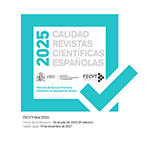The term of Qur’ānic origin Amr Allāh (‘God’s Order’) and Islamic transcendental linguocentrism around the twelfth century
Abstract
Appart from its frequent occurrences throughout the Qur’ānic text, the term Amr Allāh, or al-Amr when referred to the godhead, has been approached from an essentialist paradigm which tends to regard it as a symbol or a holy entity by itself. So considered, the term Amr Allāh has been at the very core of what may be called ‘transcendental linguocentrism’ in several trends of Islamic thinking, around sixth Century AH / twelfth century CE. The term and its implications are explored in a wide range of discourses, in particular (1) the Almohad discourse, (2) the Aarite conceptions of the uncreatedness of the Qur’ān as well as the ethical principles, and (3) Islamic cosmologies; taking into account parallel notions in different religious of philosophical traditions from outside the Islamic realm.
Downloads
Article download
License
In order to support the global exchange of knowledge, the journal Anaquel de Estudios Árabes is allowing unrestricted access to its content as from its publication in this electronic edition, and as such it is an open-access journal. The originals published in this journal are the property of the Complutense University of Madrid and any reproduction thereof in full or in part must cite the source. All content is distributed under a Creative Commons Attribution 4.0 use and distribution licence (CC BY 4.0). This circumstance must be expressly stated in these terms where necessary. You can view the summary and the complete legal text of the licence.










